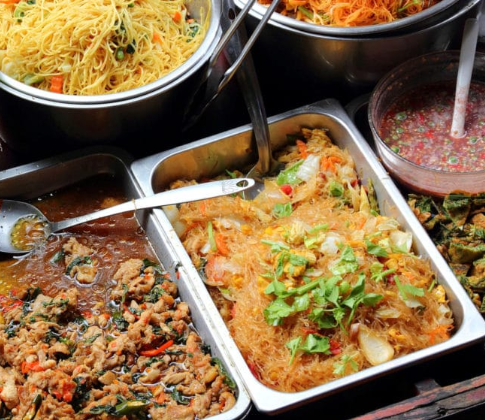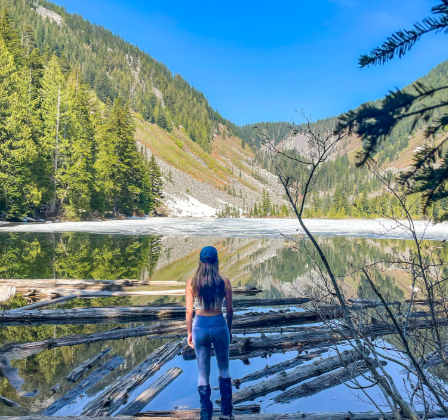
Traveling the world for an extended period, whether it’s for a few months or even a year, is both exciting and nerve-wracking, especially if you’re a solo traveler. If you’re just starting out, it’s easy to feel overwhelmed about where to begin, what to pack, and even which travel gear will suit your journey best. Trust me, I’ve been there.
Throughout my travels, I’ve picked up a lot of valuable lessons and a few tips I wish I had known earlier. From essential items you shouldn’t forget to tips for staying safe, here’s a collection of advice that can make your travels smoother and more enjoyable.
1. Pack What You Love Wearing
When I first started traveling, I made the mistake of packing things because they seemed practical, not because I actually liked them. Those bulky hiking pants I bought seemed like a good idea at the time, but looking back, I rarely wore them. Now, I stick with clothes I truly enjoy wearing, and I don’t buy extra items unless they’re necessary for specific activities, like hiking boots or thermals.
2. Don’t Feel Pressured to Follow the Crowd
It’s easy to get caught up in FOMO (fear of missing out) when traveling, especially when others rave about destinations. I met a traveler in La Paz who felt guilty for not visiting Sucre, but she just didn’t have the time. Remember, your trip is yours to design. Focus on what excites you, not what others think you should do.
3. Carry Multiple Bank Cards
Having more than one bank card is essential for emergencies. I always keep a credit card on hand, as it can be incredibly useful in situations like hospital visits. In Thailand, for example, I was able to cover emergency expenses by showing a credit card while waiting for my insurance to confirm coverage. I recommend using a travel-friendly card like Revolut, which offers minimal fees, a good exchange rate, and easy card management.
4. Pack Two Padlocks
A TSA-approved padlock is essential for securing your backpack or locker, especially in hostels. Having a second lock for your daypack is a smart move, especially during overnight bus rides where security can be a concern.
5. Develop a Check-In/Check-Out Routine
When you’re traveling with valuables like a laptop, always check that everything is accounted for before and after you check in or out of a place. Keep track of your belongings, especially when you’re in shared accommodations, and make sure your valuables are stored securely.
6. Invest in Travel Insurance
Medical emergencies abroad can result in huge bills, so don’t skimp on travel insurance. I personally use World Nomads, but it’s important to shop around and find the best deal for your specific needs. Be sure to read the policy thoroughly so you know exactly what is covered.
7. Don’t Forget Earplugs and an Eye Mask
If you’re a light sleeper, earplugs and an eye mask are lifesavers. I use them in dorm rooms to block out noise, and they’re essential for getting some sleep during long bus rides or when staying in places with noisy environments.
8. Bring Flip Flops
Flip flops are incredibly versatile for travel. They come in handy after long treks when your feet are sore or when using shared bathrooms that may not always be the cleanest. They’re lightweight, easy to pack, and a great addition to your travel footwear.
9. Stock Up on Feminine Hygiene Products
Tampons can be difficult to find in some countries, so I always pack a supply before I go. It’s one less thing to worry about, and it can save you both time and money.
10. Be Smart About ATMs
Not all ATMs are created equal, so make sure you try a few different ones to avoid high withdrawal fees. In many places, you’ll be shown the fee before completing the transaction, allowing you to opt out if it’s too high.
11. Embrace Freedom
When you’re used to the structure of a 9-5 job, it’s liberating to travel and decide your next steps on a whim. You don’t have to have every moment planned out. Instead, let your mood and the new places you discover shape your journey.
12. Share Your Itinerary
Always share your travel plans with someone back home. Whether it’s a family member or a friend, giving them your itinerary is essential for safety reasons. You never know when you might need help or when plans change unexpectedly.
13. Keep Valuables Close on Long Journeys
On long bus rides or train trips, it’s easy to get distracted. Avoid putting valuables in your main bag or in overhead compartments. Always keep them with you to reduce the risk of theft.
14. Don’t Forget to Take Photos
Capture the moments that matter. Even though I sometimes didn’t carry a tripod, I asked people around me for help. Whether it was a fellow traveler or a local, I always ended up with great photos that now remind me of my adventures.
15. Use Packing Cubes
Packing cubes are an absolute game-changer for keeping your bag organized and maximizing space. I can pack faster and find my clothes more easily with them, making my travels smoother.
16. Have Some Emergency Cash
Keep some emergency cash on hand for situations when your card doesn’t work, or there’s no ATM nearby. It’s always helpful to have a backup when things don’t go as planned.
17. Don’t Expect Things to Work Like Back Home
Expect delays, power outages, or sudden changes in plans. Travel often involves unexpected challenges, but that’s part of the journey. Embrace the chaos and remember that you’re learning along the way.
18. Travel During Shoulder Seasons
Visiting destinations during the shoulder seasons (just before or after peak season) can be a great way to avoid the crowds and save money on accommodation while still enjoying decent weather.
19. Track Your Spending
It’s easy to overspend when you’re on the road, so track your expenses to ensure you stay within your budget. I use an app called Tripcoin to help me monitor my daily spending and categorize expenses.
20. Disconnect from the Internet
While it’s tempting to constantly check social media, I found it more fulfilling to disconnect and stay in the moment. I typically posted my updates after leaving a destination, allowing me to focus more on experiences rather than online engagement.
21. Get Your Vaccinations Early
Don’t leave vaccinations to the last minute. Some countries may require proof of vaccination before entry, so make sure you take care of this well in advance.
22. Go at Your Own Pace
There’s no need to rush. Take rest days when you need them. Sometimes you just want to relax and take in your surroundings rather than ticking off another destination.
23. Keep a Journal
Traveling can be overwhelming, and you might forget certain details along the way. A travel journal is a great way to keep track of your experiences, thoughts, and emotions during your journey.
24. Always Pack Extra Toilet Paper
Some places might not provide toilet paper, so carrying your own is always a good idea. You’ll appreciate it when the situation arises.
25. Download Maps Before You Go
Having offline maps on apps like Maps.me can be incredibly helpful when you’re navigating unfamiliar areas without internet access.
26. Bring a Medical Kit
A small medical kit can be a lifesaver. Include basic supplies like bandages, antiseptic cream, and any medication you may need for specific destinations.
27. Don’t Overbook Your Accommodation
While it’s a good idea to book accommodation for popular places, leaving some flexibility in your travel plans allows you to negotiate better rates and adjust plans on the fly.
28. Learn a New Skill
Travel is a great opportunity to pick up new skills. I took cooking classes in Thailand and Argentina and even tried learning Spanish while in Bolivia. It’s a fun way to immerse yourself in the culture.
29. Assess the Cost vs. Value
Not everything is worth the price tag. Do your research and make sure that the experience you’re paying for matches the value you expect.
30. Backup Your Photos
Cloud storage is great, but having an external hard drive is even better to avoid worrying about losing your precious memories while traveling.
31. Get Souvenirs
Souvenirs can be a great reminder of your travels. Don’t worry too much about adding weight to your bag—just buy what’s meaningful and adds to your experience.
32. Don’t Complain About Prices
Remember, not everything will be cheap. Be respectful of the local pricing and understand that some items may cost more in tourist-heavy areas.
33. Wander Without a Plan
Sometimes the best experiences happen when you simply wander around, discovering unexpected places and meeting new people along the way.
34. Keep Spare Passport Photos
You never know when you might need extra passport photos. It’s better to have them ready just in case.
35. Check Your Passport’s Expiry Date
Ensure your passport is valid for the entire duration of your trip, especially if you’re traveling to countries with strict entry requirements.
36. Find a Backpack That Fits
Choose a backpack that suits your body and needs. Test it with weights and adjust it to ensure it’s comfortable for long journeys.
37. Get Recommendations from Fellow Travelers
Some of my best travel destinations came from recommendations from people I met along the way. Travelers always have great tips for off-the-beaten-path spots.
38. Carry a Spare Battery Pack
A spare battery pack is essential for long days when you’re out exploring and need to charge your devices.
39. Don’t Overpack for “Just in Case” Situations
If you think you might need something but aren’t sure, leave it behind. Chances are, you won’t need it.
40. Spend Extra for Safety
Sometimes, it’s worth spending a little more for peace of mind, especially when it comes to safe transport options or secure accommodations.
41. Be Prepared for Bank Requirements
If you’re from the UK, remember that some banks may require an additional card reader for online transactions. Always notify your bank before you travel.
42. Go on a Foodie Tour
Food tours are a great way to dive into the local cuisine and culture. Don’t hesitate to try one!
43. Join Online Groups Before You Travel
Facebook groups are a great way to connect with other travelers and arrange meet-ups or activities.
44. Pack Medication
Be sure to carry any prescription medication you might need, along with enough supplies for the entire trip.
45. Learn to Live with Less
Traveling teaches you that you don’t need much to live happily. Embrace the simplicity of a minimalist lifestyle.
46. Learn a Few Local Phrases
Learning the basics of the local language can go a long way in building relationships and navigating new places.
47. Get the Yellow Fever Certificate if Needed
Certain countries require proof of yellow fever vaccination, so don’t forget to bring your certificate if it’s necessary.
48. Observe Local Customs
Respect the local customs, especially when it comes to dress codes or behavior in certain places, like religious sites.
49. Not All Accommodations Are Online
In some places, like Cuba, asking locals for recommendations can lead to better, cheaper stays that aren’t listed online.
50. Share Your Travel Story
Your travel experiences can inspire others. Share your story, and you might encourage someone else to go on their own adventure!
These tips will help you stay prepared and enjoy your journey. Safe travels!






